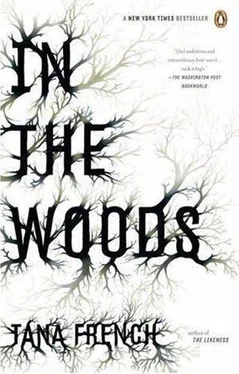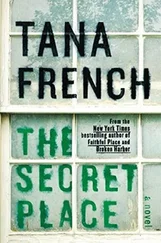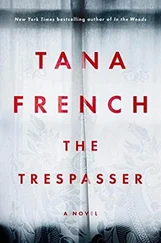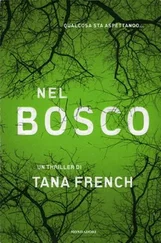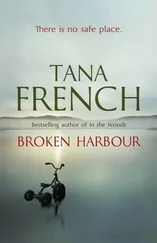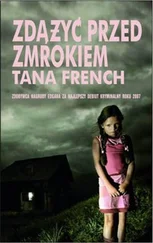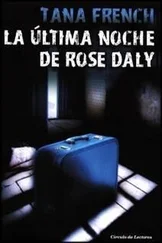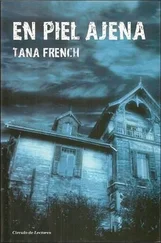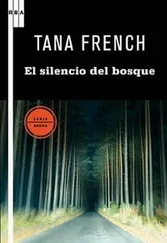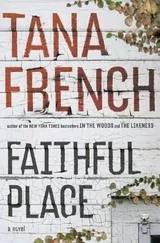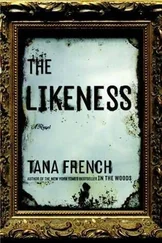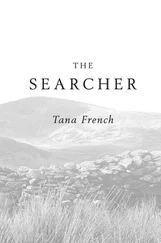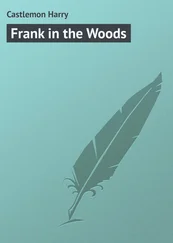"But she was found on an altar that the Druids used for human sacrifice, wasn't she?" the woman demanded.
"No comment," I said automatically. I had just realized what the stone table reminded me of, that deep groove round the edge: the autopsy tables in the morgue, grooved to drain away blood. I had been so busy wondering whether I recognized it from 1984, it hadn't even occurred to me that I recognized it from a few months ago. Jesus.
Eventually the reporters gave up and started drifting off. Cassie had been sitting on the steps of the finds shed, blending into the scenery and keeping an eye on things. When she saw the large journalist homing in on Mark, who had come out of the canteen heading for the Portaloo, she got up and wandered towards them, making sure Mark could see her. I saw him catch her eye, over the reporter's shoulder; after a minute Cassie shook her head, amused, and left them to it.
"What was that all about?" I asked, fishing out the key to the finds shed.
"He's giving her a lecture about the site," said Cassie, dusting off the seat of her jeans and grinning. "Every time she tries to ask anything about the body, he says, 'Hang on,' and goes into a rant about how the government is about to destroy the most important discovery since Stonehenge, or starts explaining Viking settlements. I'd love to stay and watch; I think she may finally have met her match."
* * *
The rest of the archaeologists had very little to add, except that Sculptor Boy, whose name was Sean, felt we should consider the possibility of vampire involvement. He sobered up a lot when we showed him the ID shot, but although he, like the others, had seen Katy or possibly Jessica around the site a few times-sometimes with other kids her age, sometimes with an older girl matching Rosalind's description-none of them had seen anyone odd watching her or anything like that. None of them had seen anything sinister at all, in fact, although Mark added, "Except for the politicians who show up to have their photos taken in front of their heritage before they pimp it out. Do you want descriptions?" Nobody remembered the Tracksuit Shadow, either, which reinforced my suspicion that he had been either some perfectly normal guy from the estate out for a walk, or else Damien's imaginary friend. You get people like this in every investigation, people who end up wasting huge amounts of your time with their compulsion to say whatever they think you want to hear.
The archaeologists from Dublin-Damien, Sean and a handful of others-had all been at home on Monday and Tuesday nights; the rest had been in their rented house, a couple of miles from the dig. Hunt, who of course turned out to be pretty lucid on anything archaeological, had been home in Lucan with his wife. He confirmed the large reporter's theory that the stone where Katy had been dumped was a Bronze Age sacrificial altar. "We can't be sure whether the sacrifices were human or animal, naturally, although the…um…the shape certainly suggests they may have been human. The right dimensions, you know. Very rare artifact. It implies that this hill was a site of immense religious importance in the Bronze Age, yes? Such a terrible shame…this road."
"Have you found anything else to suggest this?" I asked. If he had, it would be months before we could disentangle our case from the media-versus-New-Age frenzy.
Hunt gave me a wounded look. "Absence of evidence is not evidence of absence," he told me reproachfully.
He was the last interview. As we were putting our stuff away, the boy tech knocked on the door of the Portakabin and stuck his head in. "Um," he said. "Hi. Sophie says to tell you we're finishing up for today and there's one more thing you might want to see."
They'd packed up the markers and left the altar stone alone in its field again, and at first the whole site looked deserted; the reporters had long since moved on, and all the archaeologists had gone home except Hunt, who was clambering into a muddy red Ford Fiesta. Then we came out from among the Portakabins, and I saw a flash of white between the trees.
The familiar, uneventful routine of the interviews had settled my mood considerably (Cassie calls these preliminary background interviews the nuthin' stage of a case: nobody saw nuthin', nobody heard nuthin', nobody did nuthin'), but still I felt something zip down my spine as we stepped into the wood. Not fear: more like the sudden shot of alertness when someone wakes you by calling your name, or when a bat shrills past just too high to be heard. The undergrowth was thick and soft, years of fallen leaves sinking under my feet, and the trees grew heavily enough to filter the light into a restless green glow.
Sophie and Helen were waiting for us in a tiny clearing, maybe a hundred yards in. "I left it for you to take a look at," Sophie said, "but I want to bag all this shit before the light starts going. I'm not setting up the lighting rig."
Someone had been using the place as a campsite. A sleeping-bag-sized patch had been cleared of sharp branches, and the layers of leaves were pressed flat; a few yards away were the remains of a campfire, in a wide circle of bare earth. Cassie whistled.
"Is this our kill site?" I asked, without much hope: for that, Sophie would have interrupted the interviews.
"Not a chance," she said. "We've done a fingertip search: no signs of a struggle and not a drop of blood-there's a big spill of something near the fire, but it tests negative, and from the smell I'm pretty sure it's red wine."
"That's one up-market camper," I said, raising my eyebrows. I had been picturing some bucolic homeless guy, but market forces mean that "wino," in Ireland, is a metaphorical term: your average down-and-out alcoholic goes for hard cider or cheap vodka. I wondered briefly about a couple, with an adventurous streak or nowhere else to go, but the flattened patch was barely wide enough for one person. "Find anything else?"
"We'll go through the ash in case someone was burning bloody clothes or something, but it looks like straight wood. We've got boot prints, five cigarette butts and this." Sophie handed me a Ziploc bag labeled in felt-tip. I held it up to the shifting light, and Cassie tiptoed to look over my shoulder: a single long, fair, wavy hair. "Found it near the fire," Sophie said, and jerked her thumb at a plastic evidence marker.
"Any idea how recently this place was used?" Cassie asked.
"The ash hasn't been rained on. I'll check rainfall for this area, but I know where I live it rained early Monday morning, and I'm only about two miles away. It looks like someone stayed here either last night or the night before."
"Can I see those cigarette butts?" I asked.
"Be my guest," said Sophie. I found a mask and tweezers in my case and squatted by one of the markers near the fire. The butt was from a rollie, made thin and smoked down low; someone was being careful with tobacco.
"Mark Hanly smokes rollies," I said, straightening up. "And has long fair hair."
Cassie and I looked at each other. It was past six o'clock, O'Kelly would be on the phone demanding a briefing any minute, and the conversation we needed to have with Mark was likely to take awhile, even assuming we could disentangle the side roads and find the archaeologists' house.
"Forget it, let's talk to him tomorrow," Cassie said. "I want to go see the ballet teacher on the way in. And I'm starving."
"It's like having a puppy," I told Sophie. Helen looked shocked.
"Yes, but a pedigree one," Cassie said cheerfully.
As we headed back across the site towards the car (my shoes were a mess, just like Mark had said they would be-there was red-brown muck grained into every seam-and they had been fairly nice shoes; I comforted myself with the thought that the killer's footwear would be in the same unmistakable condition), I looked back at the wood and saw that flutter of white again: Sophie and Helen and the boy tech, moving back and forth among the trees as silently and intently as ghosts.
Читать дальше
